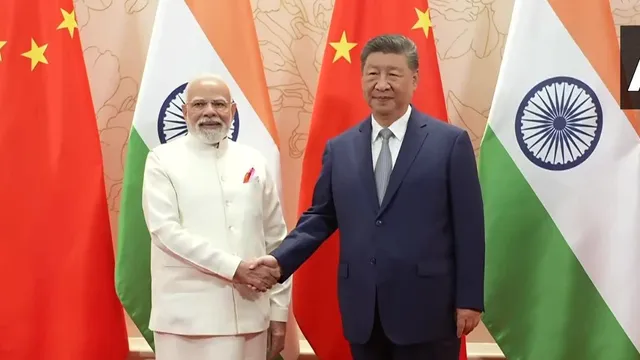- By Supratik Das
- Sun, 31 Aug 2025 12:02 PM (IST)
- Source:JND
Prime Minister Narendra Modi and Chinese President Xi Jinping had a significant meeting on Sunday during the Shanghai Cooperation Organisation (SCO) Summit in Tianjin. This meeting marks a new phase in the complicated relationship between India and China. They discussed peace along the Himalayan border, trade challenges, and the need for both countries to collaborate in creating a multipolar global order.
'India and China Must Work For Humanity': PM Modi
In his opening remarks, Prime Minister Modi emphasised that the destiny of India and China is interlinked, given the sheer size of their populations and their historic role in the global economy. “The interests of 2.8 billion people of India and China are linked, and our cooperation can pave the way for the welfare of the entire humanity. We are committed to progressing our relations based on mutual respect, trust, and sensitivities,” PM Modi said, according to a video posted on his official X account. The Prime Minister underlined that following the disengagement of troops along the disputed border, an “atmosphere of peace and stability has been created” which is providing a foundation for forward-looking engagement between the two nations. Modi also pointed out that India and China had reached a new understanding on border management, though he did not share specific details. PM Modi further disclosed that direct flights between the two countries, suspended since the outbreak of the COVID-19 pandemic in 2020, would soon resume, giving a boost to people-to-people exchanges and economic connectivity.
Sharing my remarks during meeting with President Xi Jinping. https://t.co/pw1OAMBWdc
— Narendra Modi (@narendramodi) August 31, 2025
'Dragon and Elephant Must Walk Together': Xi Jinping
Chinese President Xi Jinping, in turn, called on both sides to look at bilateral ties through a “long-term and strategic lens” rather than being driven by short-term challenges. “The world is undergoing transformation. China and India are two of the oldest civilisational nations and the world’s two most populous countries. It is vital for the Dragon and the Elephant to come together, to be friends and good neighbours,” Xi said during his interaction with Modi. Xi also underlined the need for Beijing and New Delhi to uphold multilateralism and support a multipolar world order at a time when the United States is increasing tariff pressure on both nations. “Both countries have historic responsibilities to work together for peace and prosperity in Asia and beyond. We must advance more democracy in international institutions,” the Chinese leader said, marking the 75th anniversary of diplomatic relations between India and China.
#WATCH | Tianjin, China: During his bilateral meeting with PM Narendra Modi, Chinese President Xi Jinping says, "... China and India are two ancient civilisations in the East. We are the world's two most populous countries, and we are also important members of the Global South.… pic.twitter.com/uJV595g54i
— ANI (@ANI) August 31, 2025
The meeting between Modi and Xi comes five years after the Galwan Valley clashes that led to the sharpest downturn in bilateral ties in decades. Both sides had engaged in prolonged military negotiations and a disengagement process along the Line of Actual Control (LAC). Modi-Xi meeting is likely a calculated effort by both leaders to stabilise relations amid intensifying tariff measures from Washington. Just last week, the United States imposed 50 per cent tariffs on Indian goods over New Delhi’s continued oil imports from Russia. China, too, has faced the prospect of 200 per cent tariffs threatened by former President Donald Trump if Beijing restricts rare-earth exports to the US. The Tianjin meeting followed a “breakthrough” discussion between Modi and Xi last year in Kazan, Russia, which helped re-establish communication channels frozen since 2020. That engagement, observers say, has accelerated a tentative thaw in ties, now visible in the resumption of flights and incremental agreements on border patrolling and trade facilitation.
The bilateral talks took place just hours before the SCO Summit, a multilateral forum that has become central to India, China, and Russia’s push for greater balance in the global order. The SCO, which includes Central Asian nations, Pakistan, and Iran, is increasingly seen as a counterbalance to Western-led economic and security institutions. Xi’s focus on “multipolarity” and Modi’s emphasis on “mutual trust and sensitivities” show that both countries want to present a united front despite ongoing tensions.
Although deep mistrust remains due to border disputes, trade imbalances, and geopolitical rifts, the Modi-Xi dialogue in Tianjin marks an important shift in India-China relations. Both sides seem to be working to align their interests to protect themselves from tariff impacts and Western economic pressures while addressing sensitive security issues at their contested border. For now, the key question is whether the commitments made in Tianjin, especially regarding border stability and the resumption of connectivity, will be fulfilled in the coming months.

